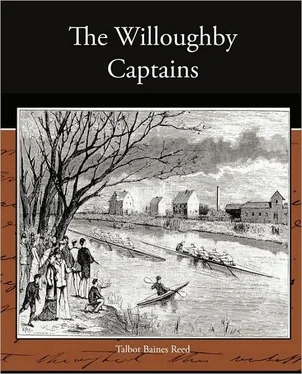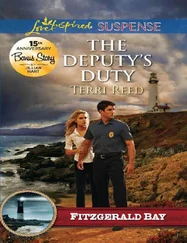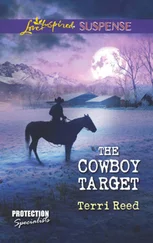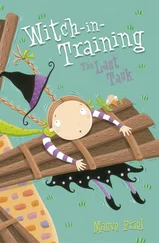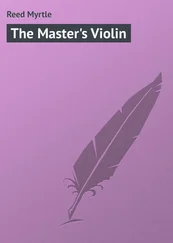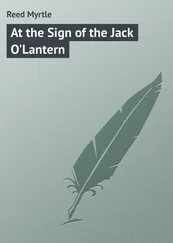“Yes,” said Parson, contemptuously; “I heard they had cheek enough to say so. But they’ll be disappointed for once.”
“Well,” said Riddell, “they’ve been practising pretty steadily of late. They’re not to be despised. Whatever has become of the juniors’ eleven in the schoolhouse, Telson?”
“Can’t make out,” replied Telson; “they’re an awful set of louts this year; only one or two good men in the lot. I don’t think they can scrape up an eleven.”
“Ah!” said the captain, seeing his chance; “you’ve lost a good many good fellows. Wyndham, for one, has got up into the second-eleven, I hear.”
“Yes,” said Parson; “and jolly cocky he is about it, too!”
“He’s not been down at the practices lately, though,” said Telson, colouring slightly, and for no apparent reason.
“Why? Is he seedy?” said the captain.
“Eh! No; I don’t think so. Wyndham’s not seedy, is he, should you think, Parson?”
“No,” said Parson, exchanging uncomfortable glances with his ally; “not exactly seedy.”
“It’ll be a pity if he doesn’t get playing in the Templeton match,” said Riddell.
Would the fish bite? If the diary had spoken true, these two boys were at present very full of Wyndham’s affair, and a trifle indignant with the captain himself for his supposed intention of reporting that youth’s transgression at headquarters. If that were so, Riddell considered it possible that, after their honest fashion, they might take upon themselves to give him a piece of their mind, which was exactly what he wanted.
“The fact is,” said Telson, “Parson and I both think he’s down in the mouth.”
“Indeed?” asked the captain, busily buttering a fresh slice of toast.
“Yes. Haven’t you seen it?” asked Parson.
“He’s in a funk about something or other,” said Telson.
It was getting near now!
“What about, do you know?” asked the captain.
“Why, you know,” said Telson. “About being expelled, you know.”
“Expelled! What for?” asked Riddell; and the boy’s reply gave him a satisfaction quite out of proportion to its merits.
“About Beamish’s, you know,” said Telson, confidentially; “he thinks you’re going to report him.”
“And he’s bound to get expelled if you do,” said Parson.
“And how do you know about it?” asked the captain, quietly.
“Oh! you know, Parson and I spotted them — that is, Gilks and Silk and him — that night of Brown’s party. But we never told anybody, and don’t mean to, so I don’t know how it came out.”
“Anyhow,” said Parson, “if he’s to be expelled, Silk and Gilks ought to catch it too. I bet anything they took him there. Thanks! a little piece.”
This last sentence was in reply to an invitation to take some more cake.
Under cover of this diversion, Riddell, with thankful heart, continued to steer the talk out again into the main channel of school affairs, of which the affair of Wyndham junior was but one of many.
Before the meal was over it had got as far Eutropius, and he fairly won his guests’ hearts by announcing that he did not consider that historian’s Latin nearly as good as Caesar’s, an opinion which they endorsed with considerable heat.
All good things come to an end at last, and so did this breakfast, the end of which found the boys in as great good-humour as at the beginning. They thanked the captain most profusely for his hospitality, which they never doubted was meant as a recognition of their own sterling merits, and of the few attempts they had lately made to behave themselves; and, after inviting him to come to a concert they were about to give on the evening of the juniors’ match, took their departure.
“By the way,” said Riddell, as they were going, “do either of you know to whom this book belongs? I found it in the playground yesterday.”
A merry laugh greeted the appearance of Bosher’s diary, which the pair recognised as a very old friend.
“It’s old Bosher’s diary,” said Telson. “He’s always dropping it about. I believe he does it on purpose. I say, isn’t it frightful bosh?”
“It isn’t very clear in parts,” said the captain.
“Did he call you ‘evil,’ or ‘gross,’ or ‘ugly in the face,’ in the part you looked at?” asked Telson; “because, if so, we may as well lick him for you.”
“No, don’t do that,” said Riddell; “you had better give it him back, though, and advise him from me not to drop it about more than he can help. Good-bye.”
With a great weight off his mind, Riddell went down to first school that day a thankful though a humbled man.
What a narrow escape he had had of doing the boy he cared for most in Willoughby a grievous injustice. Indeed, by suspecting him privately he had done him injustice enough as it was, for which he could not too soon atone.
In the midst of his relief about the boat-race he could scarcely bring himself to regard seriously the boy’s real offence, bad as that had been; and, indeed, it was not until Wyndham himself referred to it that afternoon that its gravity occurred to him.
Just as the special meeting of the Parliament (convened by private invitation of Game and Ashley to a select few of their own way of thinking) was assembling, Wyndham, in compliance with a message from the captain, strolled out into the Big towards the very bench where yesterday he had had his memorable talk with Silk.
Riddell was waiting there for him, and as the boy approached, his wretched, haggard looks smote the captain’s heart with remorse.
He had scarcely the spirit to return Riddell’s salute as he seated himself beside him on the bench and waited for what was to come.
“Old fellow,” said Riddell, “don’t look so wretched. Things mayn’t be so bad as you think.”
“How could they be anything else?” said Wyndham, dolefully.
“If you’ll listen to me, and not look so frightfully down,” said the captain, “I’ll tell you.”
Wyndham made a feeble attempt to rouse himself, and turned to hear what the captain had to say.
“You wonder,” said Riddell, “how I came to know about that visit to Beamish’s. Would it astonish you to hear that till this time yesterday I never knew about it at all?”
“What!” exclaimed Wyndham, incredulously; “you were talking to me about it two or three days before.”
“So you thought. You thought when I said it was my duty to report it, and that the honour of the school was involved in it, and all that, that I was talking about that scrape at Beamish’s.”
“Of course you were,” said Wyndham. “What else could you have been talking about? I confessed it to you myself.”
“And you couldn’t see what the honour of the school had to do with your going to Beamish’s, could you?” asked Riddell.
“Well, no. Perhaps it has, but I didn’t see it at the time.”
“Of course not,” said the captain, “and if I had been thinking of Beamish’s I should never have said such a stupid thing.”
“Why, what do you mean?” said Wyndham, puzzled.
“Why, this. In all our talks you never once mentioned Beamish’s. You concluded what I suspected you of was this, and I concluded that the scrape you were confessing was the one I suspected you of.”
“What do you suspect me of, then?” inquired Wyndham, “if it wasn’t that?”
“I’m ashamed to say,” said the captain, “I suspected you of having cut the lines of Parrett’s rudder at the boat-race.”
Wyndham, in the shock of this announcement, broke out into an almost hysterical laugh.
“Suspected me of cutting the rudder-lines!” he gasped.
“Yes,” said Riddell, sorrowfully. “I’m ashamed to say it.”
Читать дальше
